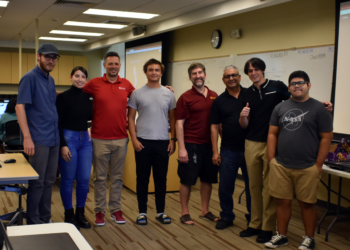Local Community Colleges Building a Future in ICT and Digital Media

With an annual revenue of more than 1 billion dollars, Esri, a global leader in the design of Geographic Information Systems (GIS), sounds like your typical Silicon Valley technology giant. And they would be, except for one thing: they’re not from Silicon Valley. They’re from the Inland Empire city of Redlands, California.
As big as Esri is, it is actually just one small part of the infinitely expanding Information and Communications Technologies (ICT) and Digital Media industry, which touches just about every aspect of our personal and professional lives today.
According to Susanne Mata, Deputy Sector Navigator of Doing What Matters for Jobs and the Economy for (Inland Empire/Desert Region), “ICT and digital media plays a role in so many different areas of the economy. Look at business software applications, for example. Outlook, Excel, QuickBooks, all are essential for many professions and all fall under the ICT umbrella. ICT is invaluable in virtually any business today.”
In California, the ICT and Digital Media industries employ more than 2 million workers and account for more than 12.6 percent ($312.1 billion) of the state’s economy. Regionally, growth projections for ICT and digital media-related jobs remain extremely high. In digital media alone, the Centers of Excellence, a leading source of regional workforce information for the California Community Colleges system, counted 9,009 jobs in Riverside and San Bernardino counties in 2016 and 94,568 jobs in neighboring Los Angeles County.
What makes this industry even more promising for job seekers is that a four-year degree is not always necessary to launch a career in these in-demand fields. Even though the average wage in these industries is almost 3 times the national average, the typical entry level education for more than 25 percent of web developer jobs in the region, for example, is an Associate’s degree, according to the Centers of Excellence.
To address this growing need, the Inland Empire’s community colleges have worked hard to create programs that teach the skills these jobs require. According to Mata, “ICT and digital media career education programs are available at all 12 of our colleges to some degree.”
Chaffey College, Copper Mountain College, Crafton Hills College, College of the Desert, and Palo Verde College all offer courses, certificates, or degrees in computer information systems. For those interested in information security and cyber defense, San Bernardino Valley College offers a certificate that is aligned with standards set out by the National Security Administration and Department of Homeland Security. Similarly, Mt. San Jacinto College’s certificate and associate degree program in digital media provides students with the tools needed for careers in web design, animation, and video design and production.
Like many regional stakeholders, Mata knows that “Community colleges are a key component in building the local workforce.” Joseph Kerski, Esri’s education manager agrees.
“We are firm believers in the community college system,” says Kerski. “They are really moving the needle.”




